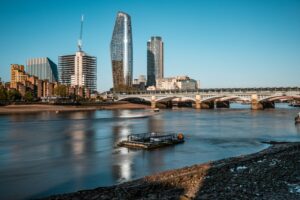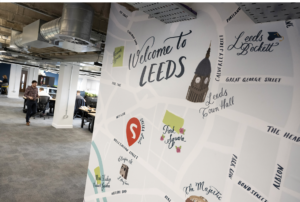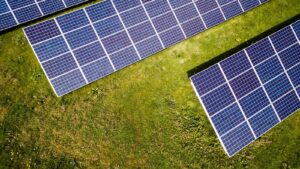Wadebridge: Re-building its local economy through energy
 Wadebridge, a small town in Cornwall, is going ‘back to the future’, localising its energy supply and, in doing so, re-building its local economy
Wadebridge, a small town in Cornwall, is going ‘back to the future’, localising its energy supply and, in doing so, re-building its local economy
Stand in Coronation Park, high above the north Cornish town of Wadebridge, and you can look down on the future of localised energy supply. Solar panels glint from the roofs of homes and schools, wind turbines whirr and solar farms are just visible in the distance. The town now gets 3% of its energy supply from renewables, and plans to have reached 100% by 2020.
It’s the day after the launch of the government’s community energy strategy – the first such strategy in England – and if anywhere is an example of how to make local energy happen, it is here.
The Wadebridge Renewable Energy Network – Wren – has focused on making local energy the norm. Indeed, 100 years ago the town was almost self-sufficient in energy and had its own company – the Wadebridge Electricity Supply Company – which used diesel to power generators and was a major source of local jobs. The centralisation and outsourcing of energy that has happened in the last 50 years is an aberration, says Wren chair Stephen Frankel.
Wren’s focus is on going ‘back to the future’, on making local energy the norm again.
‘It can’t be a marginal hippy thing,’ says Frankel. ‘It has to be completely mainstream.’
So, Wren has a shop on the high street, where locals can pop in and get advice on making their homes warmer or installing solar panels. The organisation plays the role of trusted intermediary, helping citizens understand energy efficiency and renewable technologies and linking them up with trusted installers. The local launderette has become perhaps the first solar-powered launderette in Britain, local homes and businesses have installed solar panels and biomass systems, and for those on low incomes, Wren uses its Community Fund – which comes from the revenue it receives from recommending people to developers – to pay the upfront costs.
‘We’re as interested in multimillion pound installations linked to the smart grid as helping someone who is miserable in their cold home’, says Frankel.
It’s reaching beyond the usual suspects to bring energy back into the hands of ordinary local people. When the organisation held its first meeting, its posters simply said: ‘Do you want to make money from wind and sun?’ The meeting was oversubscribed, and an eighth of the town’s inhabitants are now members.
Going back to its innovative past
Wren’s initial focus was on bringing renewable energy to the town, regardless of its ownership. It has gone into partnership with renewable energy developers, to help them get developments through the planning system with community support, and distributes the community benefit funds from such ventures through a local grants scheme. Increasingly, however, it is moving towards joint and total community ownership of local energy projects that would allow the community the control to set their own tariffs and keep all the revenues from such developments within the locality.
It works within the boundaries of the town, thus creating a model that other areas can replicate within their own boundaries. Frankel says that around 30% of England is made up of settlements like Wadebridge, with fewer than 10,000 people and renewable resources on tap. Cornwall has the best sun and wind in western Europe as well as a marine resource and is well-placed to capture this energy and put it to work – not for individual profit but for the collective benefit.
The organisation has recently launched a local currency, the Wren, which is accepted by local shops and businesses; notes are given to people instead of a discount when they sign up for renewable installations in their homes.
After halting the leaking of energy revenues from the town, the next stage is to stop the leaking of young people in search of work. Wedged between Padstow – where Rick Stein’s restaurant has assured a flow of foodie tourists – and Rock – home to the highest number of millionaires in Cornwall – Wadebridge is a very ordinary town with a declining population. Young people find jobs in the local fishing industry or tourism, but most leave and don’t come back.
Looking back over the town’s past however, finds a hotbed of technological innovation. Wadebridge was the third place in the world to have a railway, brought in by local philanthropist William Molesworth, and its foundry won international awards for its innovation.
There are now plans to make Wadebridge a centre of innovation again as part of the Smart Cornwall initiative, with innovation hub on the river that will attract businesses in smart energy and healthcare, using superfast broadband to connect with global markets.
Wren began its life when a group of local people tried to stop a new supermarket development. After a series of battles the group decided that, instead of trying to stop development plans for the town, it would create its own.
‘Rather than stop the wrong fork, we’re exploring the right fork,’ says Frankel. The network has created a model for the future sustainability of the town’s energy and economy – and in the process has put Wadebridge back on the map.
The Wren Way
- Engage: make it mainstream so that it involves the whole community
- Reduce: Substantially reduce energy consumption
- Generate: 30% renewable electricity by 2015 rising to 100% (all ownership) by 2020
- Retain: economic benefit locally through local ownership, community fund, local energy supply, inward investment
- Replicate: establish a replicable model and subject the process to academic evaluation
For more information on Wren click here.














